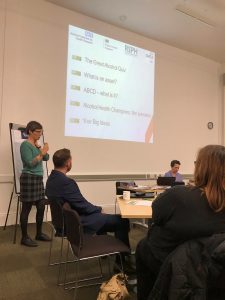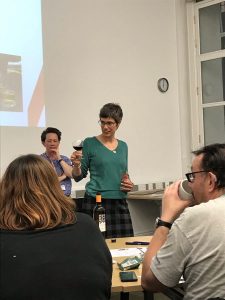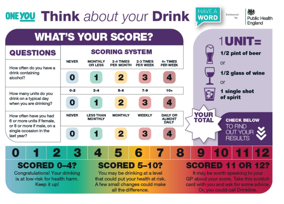Debate Discover Discuss ESRC Festival 2018
Almost a year to the day since Communities in Charge of Alcohol (CICA) first rolled out across Greater Manchester, the University of Salford research team had the pleasure of running an ESRC Festival event in Manchester’s vibrant city centre. Our twilight session, on Tuesday 6 November 2018, was attended by pioneering alcohol health champions from Salford, local CICA leads from Bury and Tameside, as well as community guardians from South Manchester. The event was hosted in partnership with Jan Hopkins (CICA project lead) from Greater Manchester Health and Social Care Partnership (GMHSCP). Lead researcher Professor Penny Cook opened the event which began with a little bit of a taster of the alcohol health champion training course: the Great Alcohol Quiz.

The Great Alcohol Quiz
One of the assumptions of the Communities in Charge of Alcohol programme is that communities have existing strengths, motivations and skills that can be used to make positive changes which benefit everyone. The opportunity to gain an accredited RSPH Level 2 alcohol health champion qualification aims to increase confidence at a personal level, and impact directly on alcohol-related harm through large-scale community action. Alcohol health champions start their journey by clarifying myths about alcohol so that with the right information they can go on to offer brief alcohol advice and influence local licensing decisions in their communities of interest.
Our Great Alcohol Quiz focused on five big myths. These surrounded old advertising, current licensing laws, unit awareness, calorie content, and the estimated ‘numbers needed to treat’ (NNT) in order for one person to significantly reduce their alcohol use as a result of brief advice. The drink-pouring exercise brought home the message that one drink is rarely one unit these days. In recent times, drinks have got stronger and measures have got larger – especially the ones we pour at home.

Can your pour one unit?

Using a scratchcard to calculate units
ABCD – what is it?
Another major assumption of CICA is the use of an ‘asset based community development’ (ABCD) approach. By strengthening and building social factors (or assets) that protect and maintain health and wellbeing, CICA in turn should strengthen and build personal and community resilience[i] . Before sharing what we already knew about ABCD’s underpinning theory of salutogenesis[ii], we asked our audience for their own definition of an asset.

What is an asset?
Our audience had individual and shared perceptions of how positive health can be created and maintained using a wide range of assets, including: People; History; Skills; Salary/finance; Culture; Passion; Goals; Ideas; Buildings.
Alcohol Health Champions: feature length film premiere
A highlight of the evening was the first showing of our feature length film: Communities in Charge of Alcohol – the story so far. Co-created with alcohol health champions from across Greater Manchester, the video gives an in-depth look at the CICA intervention from its conception to roll-out. It includes interviews with volunteer champions themselves, as well as insights provided by CICA co-ordinators.
Your Big Ideas
We closed our 2018 ERSC Festival event by posing the question: what big ideas would you use to encourage more people to become assets in their own communities? There were many!

What’s your big idea?

What’s your big idea?

[i] Public Health England 2015. A guide to community-centred approaches for health and wellbeing.
Leave a comment